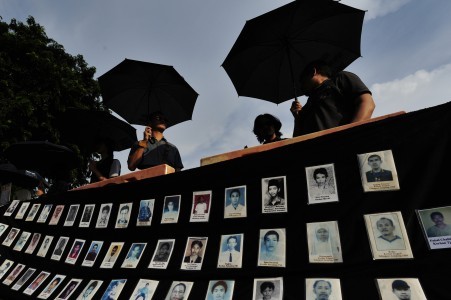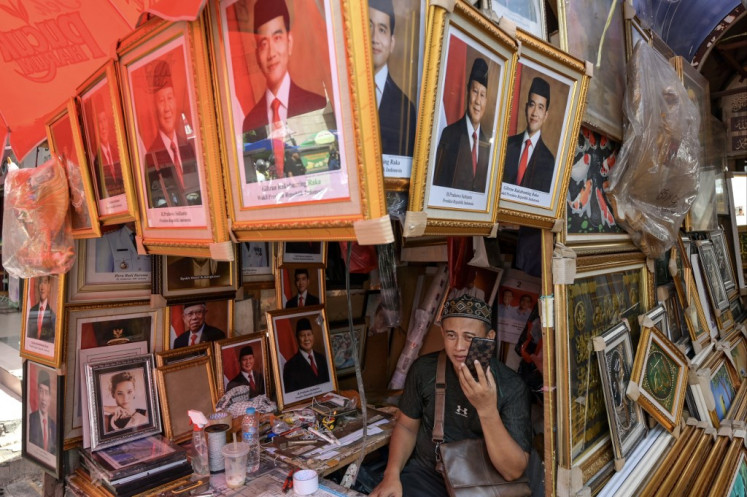Be fearless, Mr. President – like Munir
I always have mixed feelings every time I listen to these lines in “Di Udara” (In the Air), a song that indie rock band Efek Rumah Kaca dedicated to Munir Said Thalib, the fearless human rights defender who was murdered 16 years ago.
Change Size
 Activists from the Victims Solidarity Network for Justice (JSKK) and the Commission for Missing Persons and Victims of Violence (Kontras) held the 436th Kamisan, a silent protest held every Thursday to push the government to settle past human rights abuses, across the Presidential Palace on March. 24. The families of the victims rejected government's plan to focus on reconciliation in the settlement of the past violations instead of judicial process to take the perpetrators to court. (Antara/Wahyu Putro)
Activists from the Victims Solidarity Network for Justice (JSKK) and the Commission for Missing Persons and Victims of Violence (Kontras) held the 436th Kamisan, a silent protest held every Thursday to push the government to settle past human rights abuses, across the Presidential Palace on March. 24. The families of the victims rejected government's plan to focus on reconciliation in the settlement of the past violations instead of judicial process to take the perpetrators to court. (Antara/Wahyu Putro)
“I could drown in the ocean / I could be poisoned in the air / I could be killed in the streets / But I will never die / Will never stop.”
I always have mixed feelings every time I listen to these lines in “Di Udara” (In the Air), a song that indie rock band Efek Rumah Kaca dedicated to Munir Said Thalib, the fearless human rights defender who was murdered 16 years ago.
On the one hand, these lines reflect the tireless struggles of human rights activists and families of the victims and the survivors of human rights violations as they continue to call for the state to fulfill its responsibility in seeking truth and reconciliation. At the same time, I realize that this song might not have been written at all if the government had made sure that justice was served.
The reform movement came with a hefty price tag: Dozens of prodemocracy activists were abducted at the end of the New Order regime in the late 1990s and thousands of people died in the antigovernment demonstrations and the rioting that ensued, while others were killed in security crackdowns.
But 22 years on, the government has continued to turn its back on the sacrifices these individuals made, whether by choice or not, to give rise to a democratic Indonesia.
The recent appointment of two former members of the Army’s Special Forces (Kopassus) to top posts in the Defense Ministry is the latest example of the government’s refusing to pay its debt to those who fought for democratic reform.
Read also: Rights body questions government commitment to human rights
In particular, that President Joko “Jokowi” Widodo signed the controversial appointments contradicts the pledge he made before the survivors and families of the victims of past human rights abuses. Never mind that Jokowi’s handpicked choice for Defense Minister, Prabowo Subianto, was found by the National Commission on Human Rights (Komnas HAM) in 2006 to have ordered the abduction of prodemocracy activists in 1997-1998, when he was the Kopassus commander.
Nine activists were later returned alive, but 13 others, including activists of the People’s Democratic Party (PRD) and poet Wiji Thukul, remain missing to this day.
Now Army generals, Brig. Gen. Dadang Hendrayuda and Brig. Gen. Yulius Selvanus were among the 11 commandos of the infamous Tim Mawar (Rose Team) who were convicted in 1999 by the Military Court for their involvement in the activists’ abduction.
The court also ordered that five of the convicted soldiers be discharged, which included Yulius. The military discharge was later annulled after the five appealed their verdict at a military tribunal, which is closed to the public.
Dadang and Yulius were among four ex-members of Tim Mawar who were promoted to one-star generals and given government positions in 2016. The Army defended the promotions, saying that the soldiers had been punished, though survivors and families of the disappeared begged to differ.
The stalled efforts to reform the military justice system is partly to blame. But Jokowi, like the other democratically elected presidents before him and the supreme command of the Indonesian Military (TNI), has opted to keep intact the pre-democracy culture of state and military impunity.
So let’s call a spade a spade: Jokowi’s pledge to resolve gross human rights violations of the past have remained mere rhetoric of his 2014 and 2019 election campaigns. He, too, has turned a blind eye and heart to the small group of Kamisan protesters who held a rally every Thursday outside Merdeka Palace for nearly 13 years, before the pandemic struck the country in March. Dressed in black, they have long demanded justice for all victims of human rights violations.
Unsurprisingly, the public doubts Jokowi’s capacity and will to resolve past human rights cases, as evidenced by a 2019 Kompas survey.
Read also: Jokowi vows to settle past human rights abuse cases. But which ones?
Jokowi once said that resolving past human rights atrocities was “not an easy task”, even though he owes his political ascendancy to the post-New Order democratic system. Still, many of the human rights cases implicate those individuals who helped him win the presidency in 2014 and reelection in 2019. Some of these very same people now hold strategic posts in his administration.
Bringing closure to past human rights violations should not pose much difficulty for the President of the country, if only he were committed to the cause.
Many witnesses are still alive, as are the military personnel implicated in these cases, including those who have never faced justice. Komnas HAM’s preliminary investigations into at least 11 unsolved cases of human rights violations have been submitted to the Attorney General’s Office (AGO), where they have languished in abeyance for years.
All it takes is the President’s political will and courage to order the Attorney General to follow up on the groundwork that Komnas HAM has already done to unveil the facts behind the atrocities. In the case of the 1997-1998 forced disappearances of prodemocracy activists, Jokowi should lead the charge by issuing a presidential decree to establish an ad hoc human rights court, as the House of Representatives recommended 11 years ago.
The least Jokowi can do for now is to stop endorsing those found complicit in human rights violations for public office. Otherwise, he is not only granting impunity to perpetrators of past human rights abuses, but also trampling on the sacrifices of those who fought and died for the very democracy.
So have courage, Pak Jokowi. Be fearless like Munir. Break the chain of impunity, lest history put you down as just another president who failed the democratic aspirations of his people.
----------
Staff writer at The Jakarta Post









